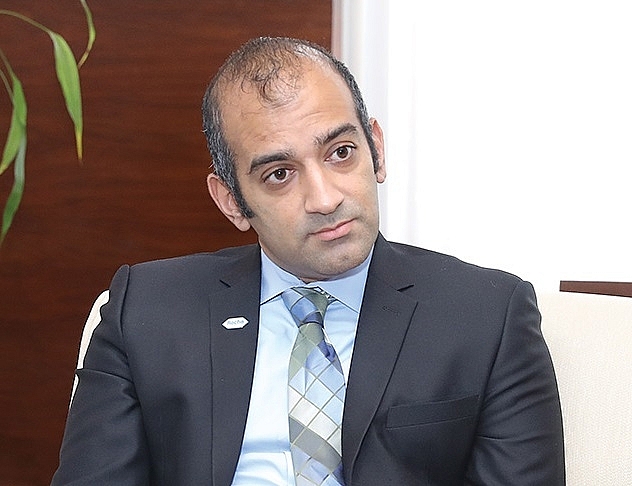Roche improving cancer care in Vietnam through innovative training and therapy
In December, the Vietnam Medical Association (VMA) and Roche Vietnam signed a strategic partnership to implement a project on improving access to innovative therapies for high-risk breast cancer patients until 2025. What are the main activities and focus of the project?
 |
| Girish Mulye, chief representative of Roche Vietnam |
As the global pioneer and leader in oncology for the last 50 years, Roche has advanced the standard of diagnosis and treatment of nearly all forms of cancer. Here in Vietnam, we challenge ourselves to go beyond supplying tests and medicines to focus on improving the entire ecosystem of patient care.
For example, in 2013 we initiated a programme called We Care For Her in partnership with the Bright Future Fund to raise awareness of breast cancer and sponsored screening about 40,000 women for this disease. Early detection of breast cancer is absolutely critical as it both for cost-effective treatment and achieving positive outcomes.
All told, this programme allowed for the detection of some 30 cases of early stage breast cancer and identified 160 patients at high-risk for breast cancer, all of which would have never happened without this programme. In addition, the initiative also conducted annual training for physicians, resulting in 600 doctors trained on identifying the early signs of breast cancer.
However, We Care For Her was our first step that focused on initially raising awareness on diagnosis rates. Our newly launched programme Joining Hands For Her seeks to improve the entire breast cancer patient journey. In close partnership with the Ministry of Health (MoH), the Vietnam Social Security, and hospitals, the programme goals are to make breast cancer screening affordable to all Vietnamese women; improve the capability and capacity of five hospitals to diagnose and care for breast cancer patients; develop a deeper understanding of nationwide breast cancer data; and increase patient access to breast cancer medicines in reputable and broadly accepted treatment guidelines.
In terms of policies, how can Vietnam learn from other countries when it comes to improving early access and maximising support?
In Vietnam, we are engaging with the government, hospitals, and the healthcare industry to expedite the availability and affordability of innovative medicines.
On the availability side, we are committed to engaging in constructive dialogue to improve regulations governing the review and approval of medicines – one such example is input provided to the recently approved Circular No.29, which was a positive development for patients and hospitals alike. We also are actively fostering the sharing of knowledge and best practices between health authorities such as enabling a recent connection between Swissmedic and the Drug Administration of Vietnam.
We are also committed to making medicines affordable to as many patients as possible. For example we collaborated with the Bright Future Fund over the last four years to run a support programme for almost 1,500 non-small cell lung cancer patients to reduce financial barriers and improve access to innovative drugs; and we are making efforts to collaborate with Vietnam Social Security to find mechanisms to make medicines more affordable.
Besides the breast cancer partnership initiative, are there any other important schemes that Roche is committed to in this country in the time to come?
Roche’s commitment contributes to the wellbeing of Vietnam in many ways, be it with the innovative therapies and tests available or improving the quality of life for patients.
Our purpose is to achieve better outcomes for more patients faster and that starts with long-term programmes like the Class of Wish in hospitals for children with cancer to continue their education and social lives; or critical response to natural disasters like organising health checks for families in at-risk areas and donating protective equipment to frontline hospitals during COVID-19 pandemic outbreaks.
Besides the strategic partnership with the Vietnam Medical Association on breast cancer, we also focus on other critical disease areas in the country.
For example, we have developed a partnership with the Mother and Children department at the MoH on a 5-year cervical cancer diagnostic programme.
What the stars mean:
★ Poor ★ ★ Promising ★★★ Good ★★★★ Very good ★★★★★ Exceptional
Themes: Healthcare Platform
- Hanoi intensifies airport monitoring amid Nipah disease risks
- Cosmetics rules set for overhaul under draft decree
- Policy obstacles being addressed in drug licensing and renewal
- Sanofi, Long Chau Pharmacy relaunch medicine blister pack collection initiative
- Takeda Vietnam awarded for ongoing support of Vietnam’s sustainability efforts
Related Contents
Latest News
More News
- State corporations poised to drive 2026 growth (February 03, 2026 | 13:58)
- Why high-tech talent will define Vietnam’s growth (February 02, 2026 | 10:47)
- FMCG resilience amid varying storms (February 02, 2026 | 10:00)
- Customs reforms strengthen business confidence, support trade growth (February 01, 2026 | 08:20)
- Vietnam and US to launch sixth trade negotiation round (January 30, 2026 | 15:19)
- Digital publishing emerges as key growth driver in Vietnam (January 30, 2026 | 10:59)
- EVN signs key contract for Tri An hydropower expansion (January 30, 2026 | 10:57)
- Vietnam to lead trade growth in ASEAN (January 29, 2026 | 15:08)
- Carlsberg Vietnam delivers Lunar New Year support in central region (January 28, 2026 | 17:19)
- TikTok penalised $35,000 in Vietnam for consumer protection violations (January 28, 2026 | 17:15)

 Tag:
Tag:




















 Mobile Version
Mobile Version